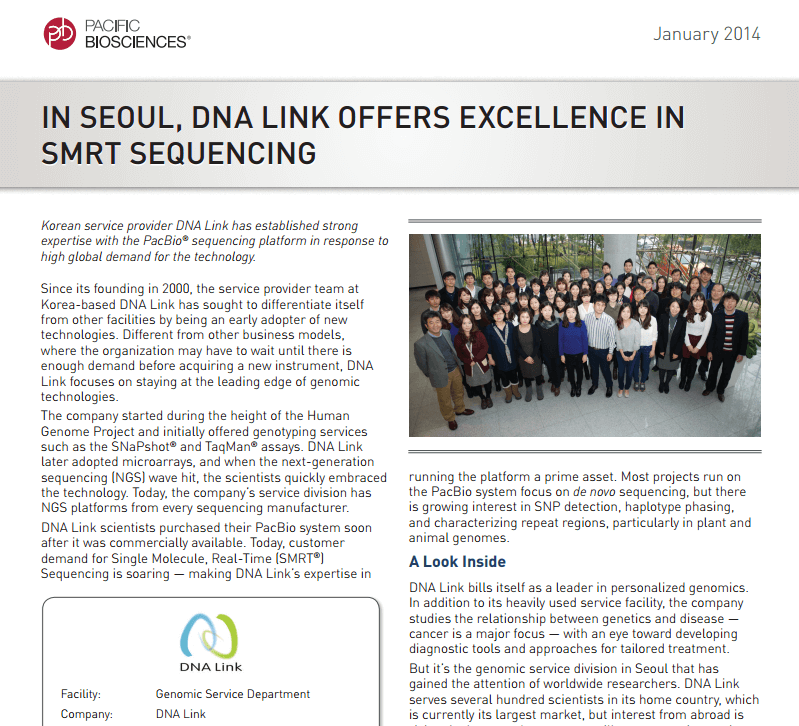Since its founding in 2000, the service provider team at Korea-based DNA Link has sought to differentiate itself from other facilities by being an early adopter of new technologies. The company started during the height of the Human Genome Project and initially offered genotyping assays such as SNaPshot® and TaqMan®. DNA Link later adopted microarrays, and when the next-generation sequencing (NGS) wave hit, the scientists quickly embraced the technology.
DNA Link scientists purchased their PacBio® system virtually as soon as it was commercially available. Today, customer demand for Single Molecule, Real-Time (SMRT®) Sequencing is soaring — making DNA Link’s expertise in running the platform a prime asset. Most projects run on the PacBio system focus on de novo sequencing, but there is growing interest in SNP detection, haplotype phasing, and characterizing repeat regions, particularly in plant and animal genomes.
DNA Link serves several hundred scientists in its home country, which is currently its largest market, but interest from abroad is rising. This month, the company will start operations at its first US branch, located in San Diego, to help build a global presence for the rapidly growing team.
One of the qualities that differentiates the service team is its interaction with customers. Along with the company’s sales team, led by Kevin Koo, DNA Link scientists frequently visit the institutions where their customers are based and encourage in-person consultations at the start of each project. “We do that more than 10 times per week,” Koo says. While it is not possible to extend that model to customers abroad, genomic services leader Gun Eui Lee and his team make sure to attend to those clients with conference calls and emails. This attention to customer service helps to ensure expectations are understood and their scientific recommendations are communicated at the start of a new project. “Their success is our success,” says Koo, “so we want to give them the right direction.”
Other attributes that set DNA Link apart are its competitive pricing and veteran staff of scientists and bioinformaticians. “We have very experienced senior staff,” Koo says, “and they provide the consistent, high-quality data that’s our strong point.”
Much of that data rolls off the PacBio pipeline that DNA Link first established in 2011. “We saw great potential in PacBio sequencing because of the unique long reads,” Lee says. From 2012 to 2013, Lee’s lab more than tripled the number of SMRT Cells used for service projects, reflecting customer demands. “That increase is really amazing,” he says. Demand for PacBio sequencing has been robust within Korea and abroad — so much so that DNA Link is now running more SMRT Cells than flow cells or chips for any of its other sequencing platforms.
Scientific interest for the PacBio service centers primarily on de novo sequencing, Lee says. His sequencing team has used SMRT Sequencing on a number of different organisms, including plant, human, animal, and bacterial genomes. Plant genomes in particular have been of interest, he says, because of their challenging repeat sequences. Short-read assemblies for these large, complex genomes have provided limited information — “but by adding these PacBio long reads, we’ve found that a lot of those repetitive regions were fixed,” Lee adds.
For more on DNA Link, read the full profile or visit their website.
